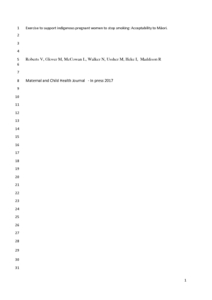Roberts, V; Glover, M; McCowan, L; Walker, N; Ussher, MH; Heke, I; Maddison, R
(2017)
Exercise to support indigenous pregnant women to stop smoking: Acceptability 1 to Māori.
Maternal and Child Health Journal, 21 (11).
pp. 2040-2051.
ISSN 1573-6628
https://doi.org/10.1007/s10995-017-2303-2
SGUL Authors: Ussher, Michael Henry
![[img]](https://openaccess.sgul.ac.uk/108948/1.hassmallThumbnailVersion/Vaughan%20et%20al%202017.pdf)  Preview |
|
PDF
Accepted Version
Available under License ["licenses_description_publisher" not defined].
Download (323kB)
| Preview
|
Abstract
Objectives
Smoking during pregnancy is harmful for the woman and the unborn child, and the harms raise risksfor the child going forward. Indigenous women often have higher rates of smoking prevalence than non-indigenous. Exercise has been proposed as a strategy to help pregnant smokers to quit. Māori (New Zealand Indigenous) women have high rates of physical activity suggesting that an exercise programme to aid quitting could be an attractive initiative. This study explored attitudes towards an exercise programme to aid smoking cessation for Māori pregnant women.
Methods
Focus groups with Māori pregnant women, and key stakeholder interviews were conducted.
Results
Overall, participants were supportive of the idea of a physical activity programme for pregnant Māori smokers to aid smoking cessation. The principal, over-arching finding, consistent across all participants, was the critical need for a Kaupapa Māori approach (designed and run by Māori, for
Māori people) for successful programme delivery, whereby Māori cultural values are respected and infused throughout all aspects of the programme. A number of practical and environmental barriers to attendance were raised including: cost, the timing of the programme, accessibility, transport, and childcare considerations.
Conclusions
A feasibility study is needed to design an intervention following the suggestions presented in this paper with effort given to minimising the negative impact of barriers to attendance.
Statistics
Item downloaded times since 11 Jul 2017.
Actions (login required)
 |
Edit Item |


